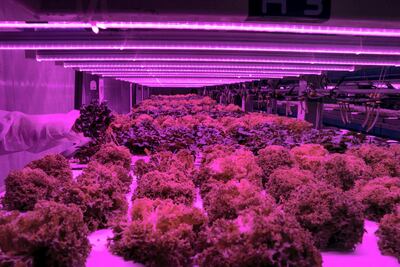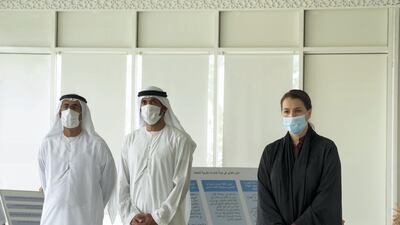There are plenty of reasons why we should all care about food security. Millions of people go hungry every day, commodity prices are rising, and we have seen that the threat of climate change and weather-related disasters can destabilise even the most resilient supply chains.
While the GCC imports 85 per cent of the food, it consumes approximately $29.5 billion per year. There is no doubt that economic and political stability provide a level of food security to the region.
But the challenges of scorching temperatures, limited water supply and finite arable land need to be addressed through an innovation-driven approach to food security. And one such innovation is vertical farming, a revolution in food technology that holds immense promise.
Adopting such an approach will provide greater access to safe, nutritious and affordable food. It would create thousands of jobs as well as abundant investment opportunities and environmental gains.
It would also contribute to the UAE’s new Operation 300bn strategy to transform the country into a manufacturing powerhouse by bolstering our industrial dynamism.
The technology is highly scalable, energy-efficient and requires less water and land than traditional agriculture. Vertical farming also produces a year-round yield and being indoors with regulated conditions, remains unaffected by the weather.
The UAE has made it clear that it wants to become a world leader for innovation-driven food security by 2051. Given the multiple benefits for the region, it is the future of agriculture in the Middle East. The focus in this part of the world is on technology-enabled production, international trade, partnerships and policies that enhance nutrition and cut food waste.
The idea behind the UAE's Food Security Strategy is to create more jobs, increase agricultural production and boost economic returns. Thus the country’s model for innovation-driven food security needs to focus on indoor farming.

The indoor farms required for vertical farming are already being built. It is now just a matter of scaling them up so the region can reduce its import dependency and in doing so, create smaller, more resilient and localised supply chains.
The UAE can cut food loss by creating an ecosystem to support vertical farming. The Food and Agricultural Organisation estimates that up to one-third of all food produced globally is lost or wasted from gate to plate. Food reaches the end consumer through a complex chain of production, packaging, processing, distribution and retail – and each point represents a risk for food to be spoilt.
There is also the environmental burden: food waste and food loss affect climate change. Huge volumes of greenhouse gases such as carbon dioxide are used each year to produce, process, store, transport and buy food that ends up in the bin – much of it in landfills that produce methane gas, 28 times more potent than carbon dioxide.
On the bright side, several companies have shown an interest in utilising this agricultural waste to create high-value by-products such as bio-oil, livestock feed and fertiliser, to minimise discarded produce and move towards a circular economy.
Growing micro herbs, leafy greens, fruits and vegetables in controlled environments will also protect crops from – what’s been dubbed a ‘crisis-within-a-crisis’ – the worst locust outbreak in decades. East Africa saw its worst swarms of locusts in decades last year.
The marauding insects were spotted in Kenya, Ethiopia, Uganda, Somalia, Eritrea, India, Pakistan, Iran, Yemen, Oman and Saudi Arabia. High winds also carried them to Dubai and Abu Dhabi, where pest control teams quickly neutralised the threat. But a swarm of 80 million locusts can easily consume enough food to feed 35,000 people a day. The risk emphasises the need for vertical farming because crops can be grown indoors in a safe environment.
Just like the fruits and vegetables they grow, food producers need a fertile ecosystem to maintain efficiency from farm to fork. As well as a business-friendly environment that cuts red tape and promotes laissez-faire economics, they need high-quality infrastructure so that goods can move fast from company to consumer.
For perishable goods, cold-chain warehouses are essential. A temperature-controlled supply chain with a connected series of refrigerated production, storage and distribution systems helps maintain freshness, minimises food loss and mitigates the environmental impact. This is important for local and global food trade.
And with its strategic geographical location and logistics infrastructure, Dubai is a conduit through which goods and commodities flow freely from all around the world. Its political and economic stability has continued to maintain food security. But the Covid-19 pandemic has demonstrated the need to ensure people in all seasons can buy food at affordable prices. The UAE has been able to maintain access to nutritious food and ongoing free trade negotiations with partners such as China, India, the EU and South American trade bloc Mercosur will only strengthen this position.
Still, delivering on the promise of innovation-driven food security requires a holistic approach. This includes scaling up vertical farming to create highly-skilled jobs, unlock investment opportunities. It will help us progress towards a future in which everyone in the UAE, at all times of the year, has access to safe, affordable and nutritious food.
Saud Abu Al-Shawareb is the managing director of Dubai Industrial City














